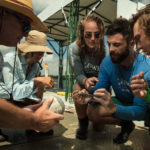For love of the fish
If you have a question about fish, Will Patterson, University of West Florida associate professor of Biology, is the man to ask. Patterson grew up fishing in Virginia. He now teaches marine biology, dedicating his career to the study of underwater inhabitants. Educating students and the community about the ecological processes that drive our region's ecosystems, Patterson has many ongoing research projects, teaches several courses and labs and works with directed independent study students and several UWF graduate students.
If you have a question about fish, Will Patterson, University of West Florida associate professor of Biology, is the man to ask. Patterson grew up fishing in Virginia. He now teaches marine biology, dedicating his career to the study of underwater inhabitants. Educating students and the community about the ecological processes that drive our region’s ecosystems, Patterson has many ongoing research projects, teaches several courses and labs and works with directed independent study students and several UWF graduate students.
“One of my favorite things about teaching is that I get to talk about fish all day,” said Patterson. “The students in our program are sharp, attentive and demand quality instruction.”
Researching commercially and recreationally exploited fishes, as well as non-targeted species, Patterson examines population dynamics to gain an understanding of the ecological effects of fishing on ecosystems. Patterson is able to estimate the age and growth of a fish by examination of growth rings laid down in otoliths, which are hardparts used in the hearing and balance system of fish and lay down growth rings similar to trees. He also uses otolith shape and chemistry as natural tags, as well as artificial tagging approaches, to examine population structure and connectivity in a variety of fishes. Examples of ongoing studies include: examining growth and nursery sources of gray snapper along west Florida; examining population connectivity in red snapper from west Florida through Campeche, Mexico; and estimating growth and migration patterns in king mackerel.
“For fisheries, the northern Gulf of Mexico, including Northwest Florida, is one of the more productive regions in the country,” said Patterson. “This region has been referred to as the fertile crescent. Due to the influence of the Mississippi River, there are a lot of nutrients fueling the system and there are a diversity of habitats and fish to study. Students, collaborators and I are working on projects that deal with coastal migratory fish and reef fishes like red snapper and gag grouper.”
One of Patterson’s most recent projects has involved a cooperative research approach to estimating population dynamics and stock mixing in king mackerel, a migratory species most commonly found in the western Atlantic Ocean and Gulf of Mexico. Patterson and Kate Shepard, a UWF graduate student who recently defended her master’s thesis, used population dynamic techniques to estimate the rate at which the populations are mixing during the winter off the coast of South Florida. Ultimatley, their research will influence future management decisions aimed at conserving this ecologically and economically valuable species.
Gearing up for his next project, Patterson will use next generation pop-up satellite archival tags to examine migratory pathways and population connectivity in Gulf of Mexico king mackerel. The sensors, which store information on flash memory, record cycles of daylight and water temperature to estimate oceanographic effects on fish movement and predict locations of the fish.
“We’re hoping to find out how vulnerable these fish are to large scale Mexican fisheries,” said Patterson. “To find out where a fish is located in the ocean every day in a year is pretty powerful information, and we hope to use this new technology in future projects.”
Learn more about UWF’s Biology and Marine Biology programs at uwf.edu/biology.
By Megan Tyson, University Marketing Communications


